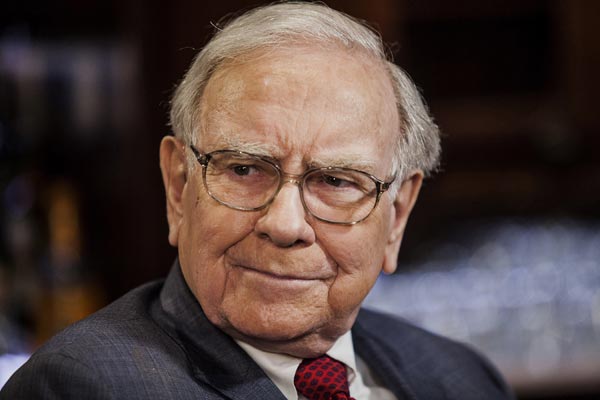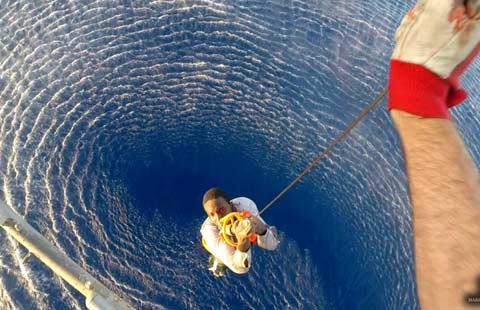Buffett bets on Chinese tourists with Precision Castparts deal
Updated: 2015-08-18 07:21
(Agencies)
|
||||||||
 |
|
Warren Buffett, chairman and CEO of Berkshire Hathaway Inc. [Photo/China Daily] |
With the purchase of Precision Castparts Corp, Berkshire Hathaway Inc's Warren Buffett is wagering that increasing world travel, especially in China and emerging markets, will buoy the aerospace industry for years to come.
Airlines have been ordering new planes to meet growing demand for travel and replacing less efficient and less comfortable jets.
This has pushed production backlogs to a record eight years, said Richard Aboulafia, an aerospace analyst with Teal Group, a Fairfax, Virginia-based consultant.
Although the industry goes through cycles and has periods when travel tapers off, such as recessions or following the terrorist attacks of Sept 11, 2001, plane production has grown steadily over the last half century, Aboulafia said. Precision Castparts, which supplies components such as turbine blades for jet engines and fasteners for airplanes, gets about two-thirds of revenue from the aerospace industry.
"It's hard to see when the good times will end," Aboulafia said. "If you believe in continued world economic growth, continued world trade and continued world travel, then this is as close as you'll get to a very safe investment."
Just as Buffett used the 2010 purchase of BNSF Railway Co, the US' largest railroad by carloads, as a proxy for growth in the domestic economy, he is banking on global economic expansion with the acquisition of 62-year-old Precision Castparts.
For the past three decades, the industry has been a good bet, said Tom Captain, Deloitte's global aerospace and defense leader. The number of kilometers flown by paying passengers has jumped more than sixfold to 6 trillion now from 900 billion in 1981, he said. That type of passenger growth is expected to continue, he said.
"It's very clear that the emerging economies and the new wealth being created outside of Europe and the US are driving the travel demand for both leisure and business," he added. "India, China, Indonesia and many of the new-found wealthy countries demand travel."
In Boeing Co's annual market outlook, the company said it expects to deliver 13,460 jets to the Asia-Pacific region over the next 20 years, followed by North America with 7,550 deliveries. Airbus Group SE, in a similar report, said it anticipates air traffic will grow at 4.6 percent annually, requiring some 32,600 new passenger and freighter aircraft.
The complexity of the components supplied by Precision Castparts to Boeing and Airbus creates an economic "moat" from competition because it's difficult for plane and engine producers to switch companies without risking quality and incurring the cost and delays for certifying new parts with regulators, said Keith Schoonmaker, an analyst with Morningstar Inc.
A push by Boeing and Airbus for suppliers to cut prices actually helps expand that moat because Precision Castparts is "the low-cost producer" due to its technology and large volume, according to Peter Arment, an analyst with Sterne Agee CRT.
"That fits right into their business model and we've seen that play out for them," Arment said. "There are very high barriers to entry."
The aerospace industry isn't foreign to Berkshire Hathaway. The company owns NetJets Inc, the largest provider of fractional ownership of private jets, and FlightSafety International Inc, which trains pilots, flight attendants, maintenance technicians and dispatchers.
Berkshire Hathaway agreed to pay $235 a share for Precision Castparts, valued at $37.2 billion including debt.
That is a 21 percent premium over the closing share price on Friday before the deal was announced. Precision Castparts was founded as a way to make a special cutter for chain saw products in 1949 and was spun out into a separate company in 1953.
The offer is below the company's peak of $273.99 on July 10, 2014. The stock has struggled after sales to the energy industry fell. Crude oil prices have dropped by more than half after topping $100 a barrel last year.
The growth rate of commercial aircraft production has also slowed every year since 2011 and is expected to decelerate this year to 2 percent before picking up to 5 percent in 2016, according to Deloitte's 2015 global aerospace and defense outlook.
"I'm of the opinion that this will be difficult to sustain," said George Hamlin, president of Hamlin Transportation Consulting.
Still, airlines are taking advantage of being profitable after years of losing money to expand and renew fleets.

 In pictures: Life near Tianjin blasts site
In pictures: Life near Tianjin blasts site
 The world in photos: Aug 10-16
The world in photos: Aug 10-16
 In the face of chaos, people persevere
In the face of chaos, people persevere
 Top 10 most expensive office markets in the world
Top 10 most expensive office markets in the world
 Times Square 'Kiss-In'
Times Square 'Kiss-In'
 School turns into place of shelter in Tianjin
School turns into place of shelter in Tianjin
 Earliest site of coal fuel found in Xinjiang
Earliest site of coal fuel found in Xinjiang
 Top 10 Chinese cities with highest property prices
Top 10 Chinese cities with highest property prices
Most Viewed
Editor's Picks

|

|

|

|

|

|
Today's Top News
Anti-corruption campaign 'good for China, US'
Rain in Tianjin poses no health risk, says official
Two HK women among four Chinese killed in Bangkok blast
Buffett bets on Chinese tourists with Precision Castparts deal
Bomb in centre of Thai capital kills at least 12
'Window' on WWII opens in Bay Area
US pilot is remembered in book, film
Sodium cyanide in Tianjin to be collected, neutralized
US Weekly

|

|






